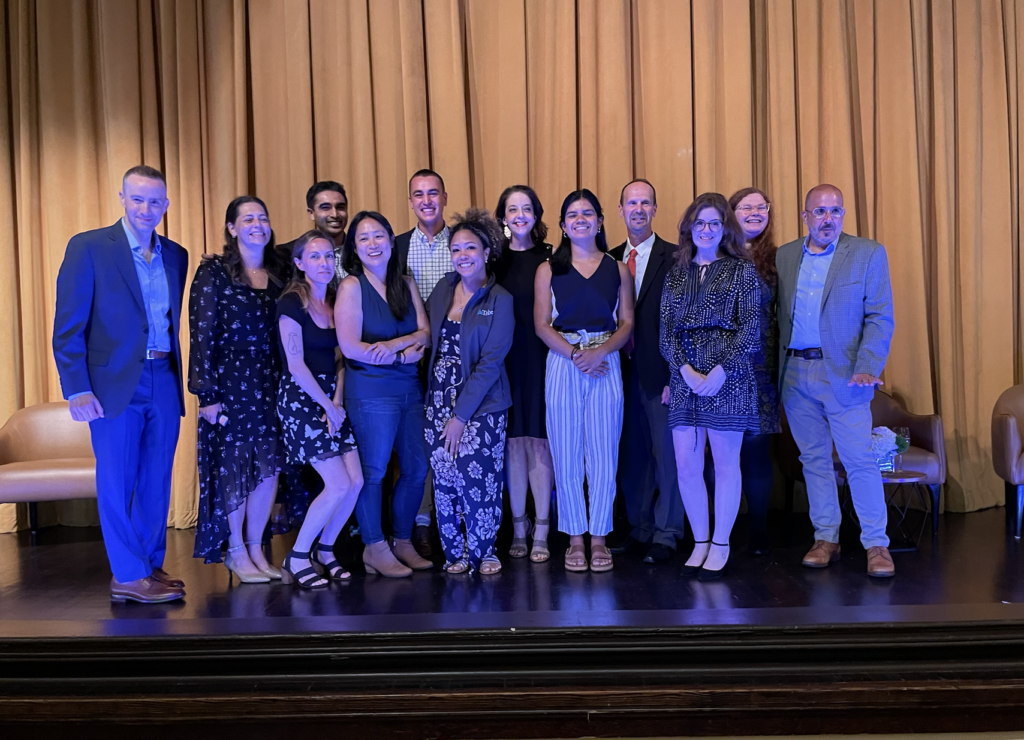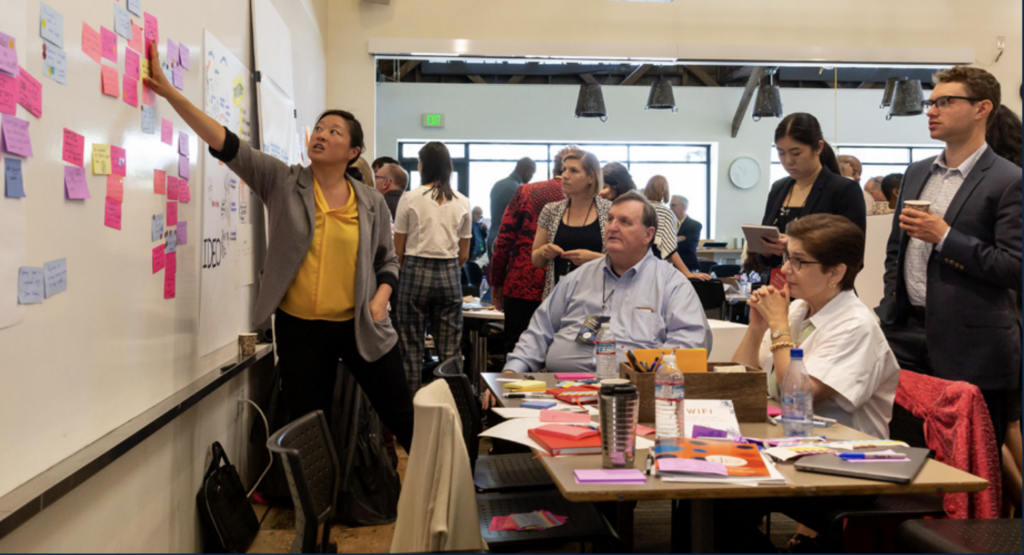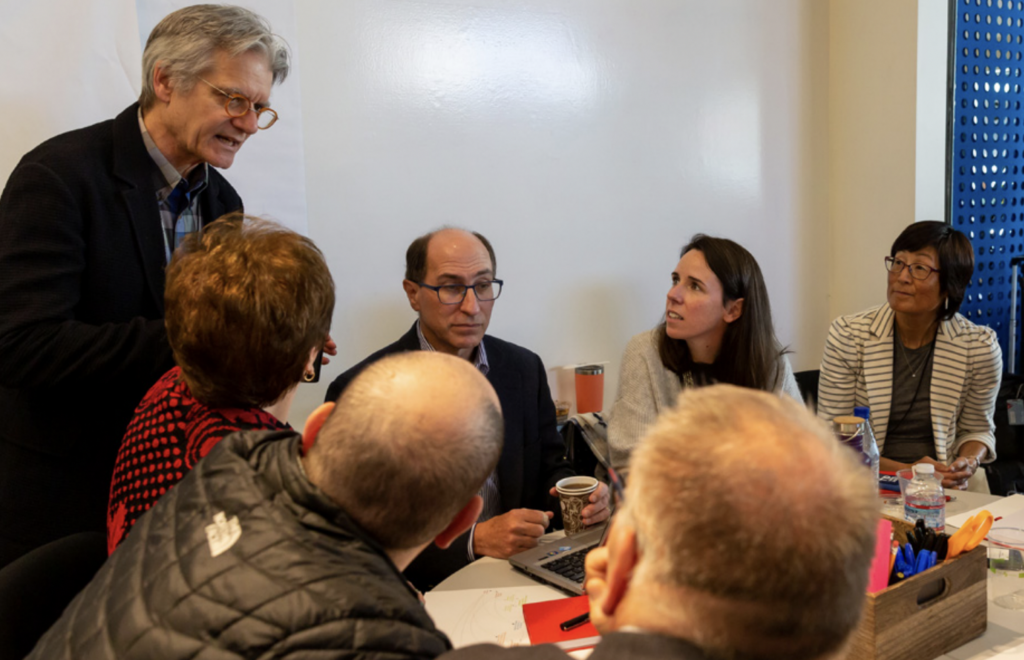At diaTribe, we aim to reduce the impact of diabetes on society and improve the lives of people with diabetes by fostering an understanding of the disease, eliminating misplaced blame, and ensuring access to care.

dStigmatize.
A diaTribe program.
We turn visionary ideas into collaborative actions to address diabetes
The diaTribe Foundation has convened annual meetings with groups of diverse leaders from across the diabetes ecosystem since 2016. These dSeries Executive Innovation Labs harness the power of collective thinking to address the problem of the global diabetes epidemic.
Working together, we can drive systemic change
The idea for dStigmatize grew out of the collaborative, action-minded spirit of the innovation labs. We are a varied group of people with different perspectives and experiences of diabetes: physicians and educators, industry executives and entrepreneurs, researchers, community leaders, nutritionists, advocates, and people with diabetes.


We seek to understand root causes of the diabetes epidemic and innovate solutions that address those causes on a systemic level.
- To reduce the impact of diabetes we need to change the system
- To change the system, we need to build a movement
- To build a movement, we need a shared vision for change
- To create a shared vision, we need to shift messaging
- To shift messaging, we need evidence-based action and education


The First Step
Stop the blame and shame…
In 2019 and 2020, we synthesized rich ideas for systemic action that arose at the d19 Executive Innovation Lab, drawing lessons from other social movement successes.
In this process, it became clear that addressing stigma and the narratives that perpetuate it is one of the most powerful steps our multi-stakeholder group can take to impact the diabetes epidemic.
We see stigma as a barrier to catalyzing the change needed across all parts of the diabetes ecosystem. Blame and shame experienced by people with diabetes, as well as overt discrimination, prevents people from seeking and receiving necessary treatment. Misplaced blame leads to a lack of openness about having diabetes, which contributes to individuals feeling isolated and reduces public perception of the severity of the problem.
Addressing stigma can help us build a larger movement, bring in more partners, and gather support for tackling other areas of necessary change: the food system, nutrition and healthcare policy, media portrayal, care access and treatment for individuals, etc.
dStigmatize work groups
Our work groups are collaborations of experts and advocates who share an interest in advancing projects in a focused area. They enable people to share expertise, coordinate resources, identify new partners, and drive action. The diaTribe Foundation leads our groups.
Work groups
Objective: Encourage research to improve our understanding of diabetes stigma
Existing studies, though useful, do not lay a sufficient foundation for documenting the scope and breadth of the problem of diabetes stigma in the USA. One goal of the research work group is to create a research agenda — with input from leading experts in diabetes and related fields — to serve as a roadmap that can guide academic research and funding for future studies that illuminate the experience of diabetes and evaluate methods for reducing stigma.
Members:
- Ananta Addala – Pediatric endocrinologist and Physician-Scientist, Stanford University
- Diana Naranjo – Clinical Professor, Pediatrics (Endocrinology and Diabetes) at Stanford University
- Elizabeth Beverly – Co-Director of the Diabetes Institute, Ohio University of Heritage College of Osteopathic Medicine
- Elizabeth Holmes-Truscott – Research Fellow, The Australian Centre for Behavioural Research in Diabetes
- Jane Speight – Foundation Director, Australian Centre for Behavioural Research in Diabetes
- Kelly Close – Founder, The diaTribe Foundation & President, Close Concerns
- Kelly Brownell – Director, World Food Policy Center at Duke University
- Kevin Joiner – Assistant Professor of Health Behavior and Biological Sciences, School of Nursing, University of Michigan School of Nursing
- Lauren Beach – Research Assistant Professor, Department of Medical Social Sciences at Northwestern University
- Rebecca Pearl – Assistant Professor, University of Florida
- Rebecca Puhl – Deputy Director, Rudd Center for Food Policy and Obesity
- Richard Wood – CEO, dQ&A
- Urmimala Sarkar – Professor of Medicine, Division of General and Internal Medicine at UCSF
Objective: Reduce stigmatizing information and interactions in healthcare settings
The healthcare group is initially focused on identifying actionable strategies that will produce “high-value wins.” Examples include surveys to identify bias among healthcare practitioners, raising awareness at annual scientific sessions and conferences, adding stigma education to residency programs, and targeting medical student associations such as AMSA to educate the next generation of doctors.
Members:
- Bob Gabbay – Chief Scientific and Medical Officer, American Diabetes Association
- Elaine Chiquette – Chief Scientific Officer, Gelesis
- Henry Rodrique – General Medicine Lead and Global Professional Relations & Independent Medical Education, Merck
- Luigi Meneghini – Vice President and Head of US Diabetes Medical, Sanofi
- Nick Cuttriss – Founding Director, ECHO Diabetes Action Network
- Orville Kolterman – Chief Medical Officer, Pendulum Therapeutics, Inc.
- Stephen Brunton – Executive Vice President, Primary Care Education Consortium
Media
Objective: Encourage accuracy and empathy in journalism and entertainment
The media advocacy group has identified several ideas for addressing diabetes stigma in popular culture: creating a “core story” to highlight key messages and a new narrative about diabetes, conducting landscape research on current media coverage of diabetes, and identifying authors and publications that write about diabetes who can be encouraged to join this effort. In memory of our friend and colleague, Thom Scher of Beyond Type 1, diaTribe wishes to dedicate the work of the media advocacy group in his name.
Members:
- Andrew Vilcinskas – Fellow, Sanofi US Public Affairs and Patient Advocacy General Medicines Team
- Anna Norton – CEO, DiabetesSisters
- Ansley Dalbo – CEO, Diabetes – What to Know
- Cherise Shockley – Corporate Digital-Social Media Manager, Roche
- David Lee Strasberg – CEO and Creative Director, Lee Strasberg Theatre and Film Institute
- Eileen Opatut – Former Senior Vice President of Programming, The Food Network
- Lee Kaplan – Director, Obesity, Nutrition, and Metabolism Institute at MGH & President, The Obesity Society
- Tracey McCarter – Interim CEO, Beyond Type 1
Objective: Grow a movement to shift the culture around diabetes in the US
The dNetwork development group is working on shaping a strategy for growth. This group explored options such as an initial ‘big splash’ campaign such as a Coming Out event and/or an influencer pledge to invite a broader audience into this effort, and discussed ways to use dNetwork connections to launch a campaign and build the visibility and funding needed for wider-reaching impact.
Members:
- Angie Bricco – Head, Sanofi US Public Affairs and Patient Advocacy
- Deana Zabaldo – Executive Coach
- James Corbett – Principal, Initium Health
- Kyle Jacques Rose – Vice President, International Diabetes Federation
- Larry Soler – Partner, Convergency
dStigmatize in the Media
- diaTribe Foundation and Australian Centre for Behavioural Research in Diabetes Partner to End Diabetes Stigma
- “The diaTribe Foundation Launches dStigmatize.org as Online Resource to Combat Diabetes Stigma“
- The Leading Voices in Food – E166: New Efforts to Combat Diabetes and Obesity Stigma in Clinical Settings
- “Advocates Take a Stand Against Diabetes Stigma“
- #dedoc° symposium at ATTD 2022
diaTribe Team
Current Team
Matthew Garza
dStigmatize Director
Shae Puckett
dStigmatize Content Manager
Jim Carroll
CEO, diaTribe
Contributors
Devanshi Gupta
Divya Gopisetty
Karena Yan
Advisors
Beth Strachan
Principal Consultant, social change consulting
Eileen Opatut
Consultant, retired television executive
Chris Barnes
Principal, Emphatic Communications
Sponsors






diabetes stigma